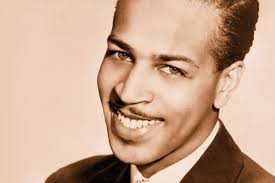Wynonie Harris, born on August 24, 1915, in Omaha, Nebraska, was one of the most influential and electrifying blues shouters of his time. Renowned for his vibrant stage presence and powerful voice, Harris is often credited with paving the way for the rock and roll revolution. His blend of rhythm and blues, infused with charisma and raw energy, cemented his legacy as one of the early architects of modern popular music.
Early Life and Musical Beginnings
Harris grew up in a household filled with music. His mother, Mallie Hood Anderson, was a church pianist, and her influence fostered Harris’s love for music at an early age. After high school, he pursued singing and began performing at local clubs in Omaha. His natural talent and magnetic charm quickly made him a standout performer.
In the early 1940s, Harris moved to Los Angeles, where he became a prominent figure in the West Coast’s burgeoning blues scene. His big break came when he joined Lucky Millinder’s band in 1944. Harris’s dynamic performances with Millinder’s group, particularly his vocal work on “Who Threw the Whiskey in the Well,” catapulted him into the national spotlight.
Career Highlights
After leaving Millinder’s band, Harris embarked on a successful solo career. He signed with various record labels, including Apollo Records and King Records, where he recorded some of his most iconic songs. During the late 1940s and early 1950s, Harris dominated the R&B charts with hits such as:
- “Good Rockin’ Tonight” (1948): A seminal track in the evolution of rock and roll, this song—originally written by Roy Brown—showcased Harris’s fiery vocal delivery and became one of his signature hits.
- “All She Wants to Do Is Rock” (1949): This playful, rhythm-driven track highlighted Harris’s ability to blend humor with irresistible grooves.
- “Bloodshot Eyes” (1951): Known for its cheeky lyrics and infectious rhythm, this song demonstrated Harris’s knack for storytelling in his music.
Harris’s high-energy performances and suggestive lyrics resonated with audiences, especially younger listeners, who were drawn to his rebellious spirit and dynamic sound. His influence extended beyond the R&B genre, inspiring a generation of rock and roll pioneers, including Elvis Presley and Little Richard.
Impact on Rock and Roll
Wynonie Harris’s contributions to music were pivotal in shaping the transition from rhythm and blues to rock and roll. His vocal style, characterized by its raw power and emotive intensity, set the template for many rock and roll vocalists. Additionally, his ability to command a stage with swagger and confidence made him a trailblazer in live performance.
Personal Life and Legacy
Harris was known for his larger-than-life personality offstage as well. His charm and flamboyant lifestyle were as much a part of his legend as his music. However, like many artists of his era, he faced challenges later in life as musical tastes shifted.
Wynonie Harris passed away on June 14, 1969, in Los Angeles, California, from esophageal cancer. Though he died relatively young, his influence on music endured. In recognition of his contributions to American music, Harris was inducted into the Blues Hall of Fame in 1994.
Conclusion
Wynonie Harris’s legacy as the “King of Blues Shouters” remains undeniable. His groundbreaking work in the 1940s and 1950s laid the foundation for rock and roll, and his influence can still be heard in the music of countless artists who followed. Harris’s ability to combine raw energy, humor, and soul in his music ensures his place as a pivotal figure in the history of American music. Through his recordings and the artists he inspired, Wynonie Harris’s spirit continues to “rock” audiences worldwide.


No responses yet